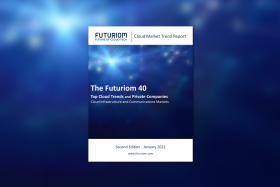Introducing the 2023 Futuriom 50!

Every year, Futuriom names the strongest private companies in key markets for cloud and communications infrastructure, including cloud cybersecurity. This year, we've increased this list size -- from 40 to 50 companies (though it's technically 51). The Futuriom 50 is out today! You can download it below in .PDF format (registration required).
The Futuriom 50 list comes out at an interesting time. The technology IPO market all but shut down in 2022, but that doesn't mean venture capital activity is dead. Three companies in the Futuriom 50 -- Celona, DriveNets, and Versa Networks -- raised a total of $460 million. Others raised money too, including many of our new entries -- of which there are 18!
The total amount of money raised by the Futuriom 50 is now $15 billion.
The technology markets have sold off and valuations have been reduced as the U.S. Federal Reserve and other central banks raised interest rates at a historical pace. Still, tech markets have bounced back off the October 2022 lows, and we are optimistic about cloud infrastructure technology, because it is core to digital transformation and efficiency efforts worldwide.
Key Trends in the Futuriom 50
The first Futuriom 40, released a year ago, already has a track record of success. Dozens of companies have staged successful exits from the list over the years and there have also been many Initial Public Offerings (IPOs).
Another key element of the report is the citation of trends generating growth for the companies included. With many secular cloud infrastructure trends in place, we expect them to continue through 2023, regardless of what the stock market does. Here are the key trends and what to expect in 2023:
Trend #1: Hybrid and multicloud management -- Organizations are moving to diversify their infrastructure to blend public cloud and private cloud resources. This is a trend that was taking hold in 2022 and is poised to accelerate in 2023.
Trend #2: Cloud and cost management -- With a more conservative business environment and potential recession in 2023, business leaders are looking to technology to help optimize existing resources and reduce costs, especially with the use of cloud.
Trend #3: Data management and pipelines -- As data proliferates across hybrid and multicloud environments, solutions and platforms required to support effective data systems are emerging, many powered by AI and machine learning (ML).
Trend #4: Edge/cloud convergence -- The technology leaders and organizations we track are increasingly looking at new ways to connect, manage, and use data at the edge in conjunction with public and private cloud resources.
Trend #5: Unified cloud security -- With cybersecurity tools multiplying like rabbits, technology leaders would like to combine and integrate new security functions as much as possible – securing data, networking, and cloud compute together in a holistic way.
These trends were compiled by our analyst team after our continual coverage of cloud markets, including our monthly Cloud Market Trend Reports, as well as by as many as five annual end-user surveys.
In compiling our list of cloud trends, we looked at three key things:
- Our survey data from the past year, highlighting key challenges from IT, cloud, and network managers
- The trend stories and report coverage we have published over the past 12 months
- Feedback from our interviews with cloud leaders in the past several months
In this report, we outline the macro trends driving cloud technology, then dive into three general themes we see for cloud technology investment. Within each of those themes we look at key micro trends we have detected over the past year.
2023 Exits and New Additions
The Futuriom 40 list from 2022 had a total of five exits from acquisitions. Our analyst team also voted off three companies from the list. With the list expanded this year to 50, that left 17 open slots for fresh blood! And our analysts had such a hard time deciding that there is actually a bonus company (number 51). No assurances we'll keep that next year.
The companies that exited included:
- Benu Networks (acquired by Ciena)
- Infiot (acquired by Netskope)
- Pluribus Networks (acquired by Arista Networks)
- WiteSand (acquired by Juniper Networks)
When our team votes on the final cut (three analysts vote), some companies can be dropped from last year's list). Considerations include market trends, product development, customer additions, or the behavior of the CEO on Zoom calls. The companies we decided to remove from 2022 included: Alkira, Triggermesh, and Weaveworks.
Download the 2023 Futuriom 50 report for the full details!
Here are some of the key highlights:
- The Futuriom 50 list (formerly F40) is the Futuriom analyst team’s assessment of the fifty most promising technology companies in cloud and communications infrastructure. This is the third year of the report and we have expanded the list from 40 companies in previous years.
- Key trends we’ll be tracking in cloud infrastructure for 2023 include hybrid and multicloud infrastructure, data management and pipelines, edge/cloud convergence, unified cloud security, and cloud and cost management. The Futuriom 50 represent the strongest companies in these areas, in our analysts’ opinions.
- 2022 was a year of acquisitions for the former 2022 Futuriom 40 – mostly smaller deals. The companies that were acquired and left the list in 2022 included Benu Networks (acquired by Ciena), Infiot (acquired by fellow F40/F50 member Netskope), Pluribus Networks (acquired by Arista Networks), WiteSand (acquired by Juniper Networks).
- The 2023 F50 companies have raised a total of $15 billion in funding.
- Top IPO candidates in the F50 include 16 companies that have raised more than $300 million. The most likely IPO candidates (next 18 months) include Aviatrix ($340 million raised), Cato Networks ($532 million), Chronosphere ($343 million), Cockroach Labs ($633 million), Databricks ($3.6 billion), Devo ($500 million), Dragos ($358 million), Exabeam ($390 million), Fivetran ($730 million), Lacework ($1.8 billion), Netskope ($983 million), Orca Security ($625 million), Rubrik ($553 million), SonarSource ($457 million), StackPath ($396 million), and Versa Networks ($316 million).
- The 2023 Futuriom 50 list (actually 51) includes the following companies: Anjuna, Arrcus, Aryaka Networks, Aviatrix, Aviz Networks, Betacom, CAST AI, Cato Networks, Celona Networks, Chronosphere, ClearBlade, Cloudbrink, Cockroach Labs, Databricks, Devo, Dragos, DriveNets, Elisity, EngFlow, Exabeam, Fivetran, Fortanix, Graphiant, Hazelcast, Hedgehog, Itential, Kentik, Kong, Lacework, Macrometa, Materialize, NetBrain, NetFoundry, Netris, Netskope, PacketFabric, Prosimo, Orca Security, Rubrik, Selector, SonarSource, StackPath, Stackwatch, Stellar Cyber, Striim, Tecton, Teleport, Tigera, TrueFort, Versa Networks, Wib.
Report total length: 48 pages
Cost: Completely Free! The project is funded by companies that license the report for distribution (contact us if you are interested in a distribution license).
Download the FREE Futuriom 50 report here.
Futuriom 50 Methodology
Futuriom analysts stay on top of the F40 throughout the year, tracking news, partnerships, funding, and technology implementations. A significant source of our intelligence comes from our work on Futuriom Cloud Market Trend Reports (CMTRs), which we publish monthly. In additional, we gather information on cloud technology trends from the 4-5 end-user surveys we collect throughout the year.
After combing through our CMTRs and having our analyst team build a database of companies, we arrive at a short list of about 70 companies. We further vet these companies on a weekly basis for two months. Each week, we eliminate some companies until we come up with our final list at the beginning of January.
If a company is removed, that doesn't mean those companies can’t succeed – it just means they are no longer on our list of the most promising companies that we track. It’s possible we missed something, or that they are being revitalized with new technology and deals, and they can return to the list. For now, however, it’s our subjective opinion that they’re not currently members of our elite class.
This has been an exciting project that helps guide our research and cloud technology teams for the rest of the year. And of course, we will start right now tracking these companies and starting to compile potential new companies for the 2023 list! We expect many more successful exits!























